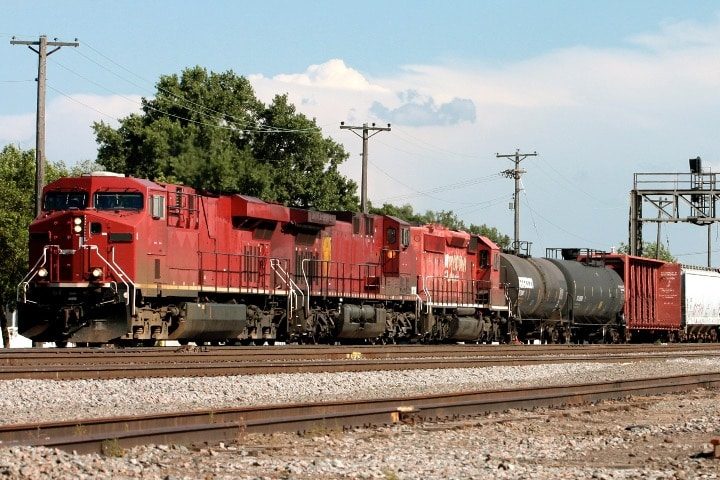
Following the news of the official merger of Canadian Pacific and Kansas City Southern into Canadian Pacific Kansas City (CPKC) — creating the first North American super railway from Vancouver to Veracruz — three other railroads are now linking their tracks to become the second North American super railway. Designed to compete against the newly-merged CPKC, Canadian National (CN), Union Pacific Railroad, and Grupo Mexico (GMXT) all announced on Monday the creation of “Falcon Premium intermodal service, a best-in-class Mexico-US-Canada service with a seamless rail connection in Chicago, Illinois.”
The joint press release provided further details of the new venture: “It will directly connect all CN origin points within Canada and Detroit, Michigan to GMXT terminals in Mexico: Monterrey, Nuevo Leon, and Silao, Guanajuato.” A map of the Falcon Premium intermodal service shows Chicago at the heart of the tri-part train service, branching from Prince George and Halifax in Canada to Silao in Mexico.
Ferromex, a GMXT company and the largest railroad service in Mexico, has rail connections in the Mexican port cities of Altamira, Guayas, Manzanillo, Mazatlán, Tampico, and Topolobampo. Ferrosur, another GMXT company and the third largest railway in Mexico, extends the connection to the Mexican port of Veracruz, which CPKC also covers.
However, Falcon Premium’s tri-part railway claims to be superior to CPKC’s super railway. “The three railroads said Monday they believe their service will be superior to CPKC because Grupo Mexico has a bigger rail network in Mexico and Union Pacific has a more direct route north to Chicago,” ABC News reported.
In the press release, Tracy Robinson, the president and CEO of CN, was quoted saying, “Falcon Premium service is a game changer for intermodal customers. By leveraging each partner’s best services and routes, we are creating a transformational new product. Our commitment is to run this service with the utmost focus to maximize speed, reliability, and customer satisfaction. This service is an example of how collaboration and cooperation can improve supply chains for customers.”
And Lance Fritz, chairman, president, and CEO of Union Pacific, said, “This bold, creative venture harnesses the strengths of three companies to provide best-in-class service to our customers in three countries, while supporting our climate goals. We are excited to be a part of this new intermodal service connection, which leverages our unmatched route into and out of Mexico and strengthens our intermodal service portfolio.”
Fritz mentioned Union Pacific’s “climate goals,” which are in line with the United Nations’ 2030 Agenda for sustainable development. Union Pacific has even released a 29-page Climate Action Plan for achieving those goals. “The Climate Action Plan outlines Union Pacific’s work to reduce its environmental impact, to achieve its science-based target, and to achieve net zero emissions by 2050. It is part of a comprehensive ESG initiative called Building a Sustainable Future 2030, and is aligned with the company’s strategic framework of Serve/Grow/Win/Together,” (emphasis added) the company’s website declares.
ESG stands for “Environmental, Social, and Governance.” It is essentially a metric used by corporations to motivate and measure their acquiescence to woke and leftist policy agendas. But that isn’t all to raise concern.
In addition to advancing a climate agenda, Falcon Premium also helps to further advance the economic and regional integration of North America as a single economic trade bloc. Building on the now defunct-NAFTA, this is precisely what the United States-Mexico-Canada Agreement (USMCA) seeks to achieve.
The USMCA’s competitiveness chapter (Chapter 26) established the creation of the North American Competitiveness Committee. According to Article 26.1, Section 5 of Chapter 26, the Competitiveness Committee is tasked with ensuring that it “promotes economic integration and development within the free trade area” and “to further enhance the competitiveness of the North American economy.” In other words, it seeks to merge the economies of North America into one, essentially a nascent North American Union (NAU), akin to the incrementally forged European Union.
USMCA promotion for the economic integration of North America was reaffirmed by then-outgoing Mexican President Enrique Peña Nieto. At the signing ceremony for the agreement in Buenos Aires, Argentina, President Peña Nieto said: “The negotiation of the Mexico-United States-Canada Treaty made it possible to reaffirm the importance of the economic integration of North America.” The “Mexico-United States-Canada Treaty” is the English translation for the Mexican government’s official designation for the USMCA in Spanish: the Tratado entre México, Estados Unidos y Canadá, abbreviated as T-MEC.
President Peña Nieto further remarked, in Spanish, about the significance of the USMCA/T-MEC: “The renegotiation of the new trade agreement sought to safeguard the vision of an integrated North America, the conviction that together we are stronger and more competitive.” He added, “The Mexico-United States-and-Canada Treaty gives a renewed face toward our integration.” And shortly after signing it, he posted the following on Twitter:
On my last day as President, I am very honored to have participated in the signing of the new Trade Treaty between Mexico, the United States and Canada. This day concludes a long process of dialogue and negotiation that will consolidate the economic integration of North America.
Mexico’s current president, Andrés Manuel López Obrador has repeatedly made similar calls for furthering the integration of the continent. For example, when U.S. President Joe Biden visited Mexico City to meet with Mexican President López Obrador back in January, for the United States-Mexico bilateral meeting of the North American Leaders Summit, López Obrador made a “comprehensive proposal” to Biden to “consolidate [the United States, Mexico, and Canada] as an economic region.” President López Obrador proposed a new policy to further the economic and social integration of North America.
“The proposal, President Biden, is comprehensive. It implies consolidating ourselves as an economic region in the world, strengthening brotherhood in the American continent, respecting our differences and our sovereignties, and ensuring that no one is left behind and that together we go in search of the beautiful utopia of freedom, equality and true democracy,” López Obrador told Biden.
To facilitate his proposal, López Obrador called for the creation of a “joint committee … aimed at planning and import substitution in North America, to try to become more and more self-sufficient” as one economic bloc.
“The US, Canada and Mexico will each propose 4 members for the formation of this group of specialists. They will have our absolute confidence to motivate, persuade and convince businessmen, workers and public servants of the importance of uniting in North America and seeking the union of the entire American continent,” he further elaborated. “We address as a priority the economic and commercial integration of the entire American continent, as well as the welfare of the peoples, leaving behind hegemonic interventionism.”
Regardless of how cognizant the CEOs and boards of directors of Union Pacific, CN, and GMXT may be about globalist designs to merge all three countries into a North American Union, their joint Falcon Premium intermodal railroad drives yet another spike on the same track as CPKC toward an NAU.
The John Birch Society has long opposed the international merger of the U.S., Mexico, and Canada into a North American Union (NAU), and as such, encourages its members to tell Congress to Get US Out! of the USMCA. For more about how the USMCA is a key step toward the creation of an NAU, read The New American article titled “USMCA and the Quest for a North American Union.” This article can be read online HERE. Physical reprint copies of the article, which are ideal for mass distribution, can be purchased at ShopJBS.org. Additionally, The John Birch Society encourages Americanists, patriots who cherish and seek to preserve U.S. national sovereignty, to use its federal legislative alert to contact and urge Congress to terminate U.S. membership in the USMCA. The alert can be accessed by clicking HERE.




